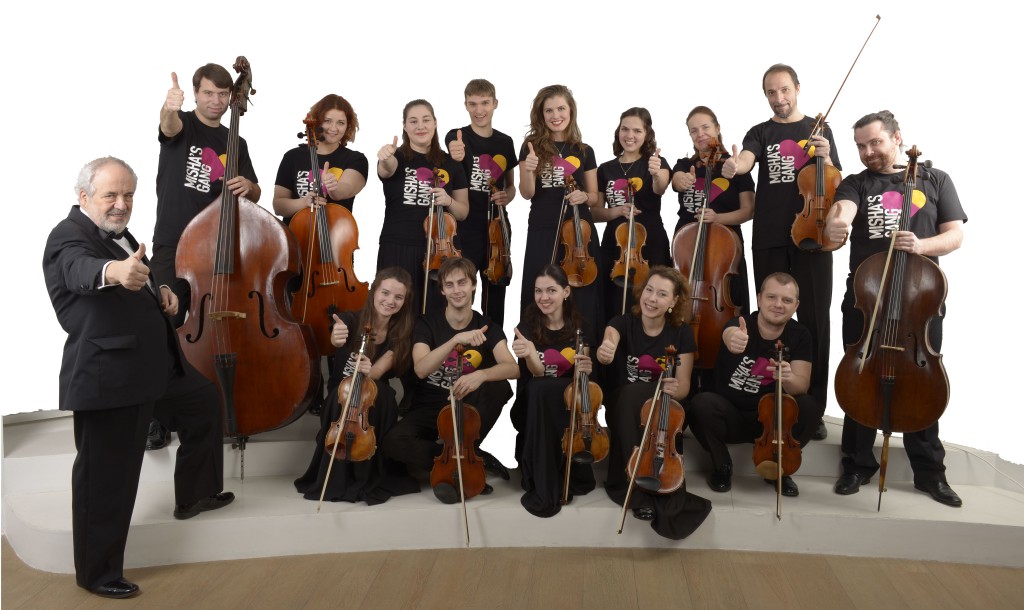Russian String Orchestra brings rich tone, versatility to wide-ranging program
Russian string playing has long set a standard for tonal sheen and incisive technique.
On Monday night Misha Rachlevsky’s Russian String Orchestra (formerly known as Chamber Orchestra Kremlin) demonstrated a wide stylistic palette and terrific esprit de corps in a concert presented by Friends of Chamber Music at Florida International University’s Wertheim Auditorium.
Elgar’s Serenade for Strings immediately exhibited this 14-member group’s considerable assets—a large corporate sonority, spot-on precision, unity of ensemble and the ability to encompass stylistically varied music of different nations. The Larghetto of Elgar’s early work sings with the depth of emotion the composer brought to his late masterworks (the Cello Concerto and Piano Quintet). Rachlevsky had the musicians utilize portamento (sliding between notes) in the manner of early 20th century orchestral playing which greatly aided in conveying the nostalgic lyricism.
With the ensemble enlarged to include harp and piano, Alexander Fiterstein was soloist in Aaron Copland’s Clarinet Concerto. Originally commissioned and premiered by Benny Goodman, the two-movement concerto alternates between Copland’s folksy Americana and jazz-infused patterns.
Fiterstein is a consummate master of his instrument. He brought warmth of tonal production and chocolaty sweetness to the long-spun melodies of the opening movement. After assaying the high leaps in register of the cadenza with showmanship and flair, Fiterstein captured the jazzy syncopations of the finale with terrific aplomb. The final leaping smear capped a brilliantly virtuosic reading.
The harp and piano strokes added rhythmic punch to the second movement and Rachlevsky and his musicians were totally in sync with Fiterstein’s phrasing and the American vernacular. Indeed the cellos and bass plucked and slapped their instruments as backup to Fiterstein’s beat, like veteran jazz players.
Dancers Gabriela Mesa and Fabian Morales (from Dimensions Dance Theater of Miami) took the stage for an excerpt from the ballet Reflections by the late choreographer Gerald Arpino. Set to Variation VI from Tchaikovsky’s Variations on Rococo Theme, the pas de deux was presented in commemoration of the 10th anniversary of Arpino’s death. Long underrated due to the towering contributions of George Balanchine and Jerome Robbins, Arpino was one of America’s finest choreographers. The Tchaikovsky excerpt is classic Arpino—a duo in the romantic tradition but with decidedly modernist angularity of movement. Mesa and Morales’ partnering was gracefully executed and cellist Andrei Berezin brought a smooth line and beautiful tone to the plaintive melody.
John Corigliano has long been one of America’s most distinguished creative artists, having enriched the repertoire with three symphonies, excellent clarinet, flute and guitar concertos and several fine song cycles.
Add the string ensemble vignette Voyage to that list. In just seven minutes, Corigliano sets mood swings of sadness and uplift. The gorgeous string writing and thematic invention have rarely been rivaled since Barber’s classic Adagio for Strings. Corigliano’s work was a perfect fit for the Russian players’ heavy vibrato and dark corporate sound.
R. Le-Grand’s arrangement of the Adagio from Mozart’s Piano Sonata in F Major was Mozart in the romanticized, technicolor mold. Hardly idiomatic, the transcription showcased the seven violins’ silken tone.
Eskender Bekmambetov, a former member of the orchestra, wrote his ten-movement suite For Misha’s Gang (“for small, regular, large and extra large fiddles”) to showcase the musicians’ solo abilities. The work gives each of the players an opportunity to shine in the solo spotlight.
Bekmambetov’s writing is highly professional but he lacks the mastery of a Prokofiev or Shostakovich to fully bring off this kind of lightweight pastiche. The Introduction, which simulates the orchestra tuning up, is clever but a “Toccata” sounds too much like Dinicu’s Hora Staccato (or as Heifetz later called it “Horror Staccato”). Concertmaster Evgeny Pravilov was definitely up to the fancy rapid fireworks.
The movement “20th of February, 2014” is clearly meant to mark a tragic day of bloody political violence in Ukraine; yet the repeated harsh string chords only spelled tedium. “Saturday Morning in Thornhill or Shabat Shalom” could have come right out of Fiddler on the Roof and violinist Oksana Koliasnikova captured the Hassidic spirit with bravura strokes.
The score’s best moments came with a brooding “Romance,” a vivacious neo-Baroque “Canon for Three” and the final “Czardas” in which violinists Koliasnikova and Lev Solodovnikov and violist Fedor Vetrov threw off plenty of gutsy gypsy pizzazz. The entire ensemble (including cellos and bass) played the last whirlwind bars standing.
Rachlevsky immediately launched into an encore of Astor Piazzolla’s Libertango, played with lively flourishes, to bring the pre-holiday evening to a festive close.
Friends of Chamber Music presents a recital by soprano Michelle Bradley and pianist Ken Noda 8 p.m. December 6 at Temple Beth Am in Miami. miamichambermusic.org; 305-372-2975
Posted in Performances
Leave a Comment
Tue Nov 20, 2018
at 11:31 am
No Comments

